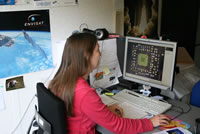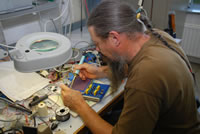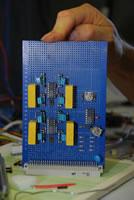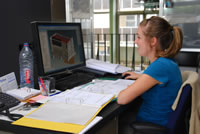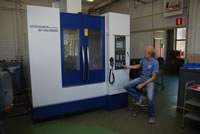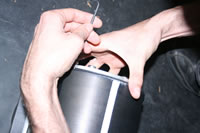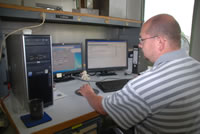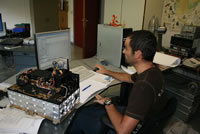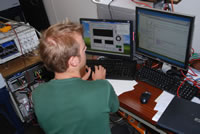Mechanical design and manufacturing
Instruments need a structure to protect the essential electronic and optical components. Most instruments contain also mechanical parts, necessary for their functioning. This is the domain of the BIRA-IASB mechanical engineers and technical staff.
They use several software packets for 2D and 3D mechanical design, such as CoCreate OneSpace Designer. The computers used for design are connected to milling machines so that the design can be manufactured directly.
The Workshop for Mechanics of BIRA-IASB is well equipped for the design and construction of mechanical parts dedicated for ground, balloon or space borne instruments (see Facilities).
Back to list of skills
Testing
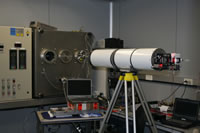
The mechanical and electronic accessories, both the ones constructed in house as the industrial parts need to be tested before they are build in the instrument. Therefore, test facilities in industry or at ESA, such as thermal vacuum chambers, are used.
But also at the institute, the engineers have a wide range of testing equipment at their disposal. More information can be found in Facilities.
Back to list of skills
Software
Nowadays almost all space instruments contain some microprocessor or FPGA based internal intelligence. The software design team of the Engineering Department has long term experience in the development of software for such embedded systems.
To operate ground-based and space instruments, suitable software is necessary. Space instruments and often also ground-based equipment are controlled from a distance.
The software therefore needs to involve multi-display handling of telecommands, telemetry and housekeeping, and is often LabVIEW based.
Also, tools for problem solving have to be foreseen.
Back to list of skills
Operations and data management
Once a space instrument is launched and brought to full operation, a new range of tasks pops up. All observations need to be carefully planned in advance. The instrument in-flight operations are dependent on different parameters, such as measurement conditions, and the good functioning of the instrument is completely dependent on the conscientious execution of the telecommands.
The return of the huge amount of data is also a challenge. The data need to be arranged and stored. They also have to be converted in formats, accessible to the scientists. Good data archiving is necessary to facilitate the work of the scientists, analyzing the data.
Thanks to their experience with several space missions, the engineers are able to cope with this assignment.
Back to list of skills
Maintenance
Ground based equipment and test versions of space experiments often last long. To keep them in excellent condition, maintenance on a regular basis is indispensable. Since most instruments are the work of the BIRA-IASB engineering group, they are best placed to perform this task.
Besides instrumental maintenance, the team is also involved in maintenance of the institute’s buildings and in ecological and safety issues.
Back to list of skills
|

